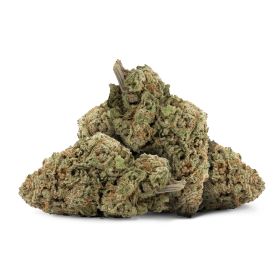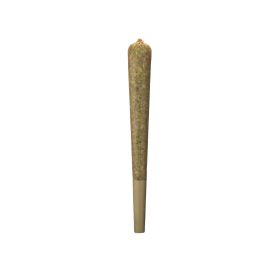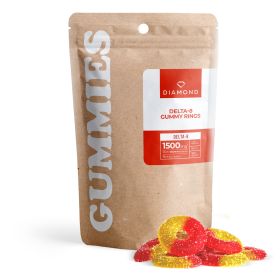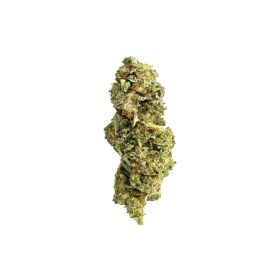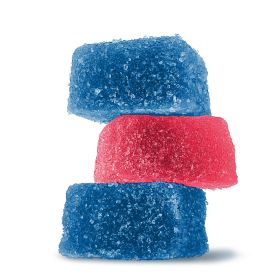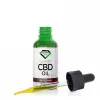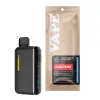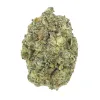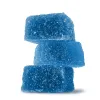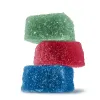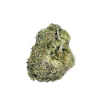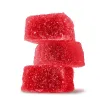What is THCV? Does this new compound get you high, or is it simply a weight-loss miracle? There are so many questions surrounding thcv — luckily, we have answers! So, if the question “what is thcv” is rattling around your brain, let’s work together to find out the answer!
After all, for years, the only constituents of cannabis that enjoyed the limelight were THC and CBD products. However, recent studies have spiked interest in THCV, with the most popular questions being “What is THCV” and “Does THCV get you high?”
Tetrahydrocannabivarin (THCV), and its other less popular counterparts, were formerly only recognized for their synergistic activity when coupled with CBD and THC. In this article, we will uncover all that science knows about THCV and how you can enjoy its benefits!
THCV Guide: What Is THCV?
THCV was first discovered in 1971, along with Cannabidivarin. Tetrahydrocannabivarin is an analogue of tetrahydrocannabinol (THC). However, it might surprise you to learn that both are not of the same origin. Still, the processes for their synthesis are somewhat similar.
One clear difference is that THCV does not originate from CBGA, or Cabergolic acid, commonly referred to as the father of all Cannabinoids. Geranyl pyrophosphate combines with diviranyl acid (instead of olivetolic acid as in THC and CBD) to form THCV. CBGVA is the product that yields the cannabinoid after decarboxylation and modification by THCV synthase.
Sound confusing? Don't worry; it gets easier — we promise!
So what is thcv? Despite its peculiar origin, THCV is indeed a cannabinoid. It differs from THC by the absence of two carbon atoms. THC has a five-carbon group attached to its ring, while THCV has a propyl attached.
THCV acts on both receptors of the endocannabinoid system. It exhibits an antagonistic behavior toward the CB1 receptors and agonistic behavior toward the CB2 receptors.
And that's just a little of the science behind your buzz!

The Benefits of THCV
Users have nicknamed THCV products "Diet Weed" or "Weederrall" for its appetite-lowering and energy-boosting effects. When we think to ourselves, “what is thcv” we rarely think about its funny names, but it has a few! And here’s why —recent research reveals that there are multiple benefits to ingesting THCV.
Sure, most "weed" gives you the munchies. But welcome to thcv, the first cannabis product to help you lose weight. Want to know the benefits of thcv? Here are a few:
What Is THCV? An Energetic Sativa or Relaxing Indica?
When looking at the benefits of THCV, it's essential to ask why — why does this cannabinoid act so different when compared to others such as CBD, delta 8, delta 9, and more? After all, many of us are used to cannabis compounds that keep us relaxed and chill.
Moreover, we're used to cannabinoids that give us the munchies.
But THCV acts differently. Many of this compound's benefits come from the fact that it energizes — sort of like delta 10. Most THCV strains are sativas and not indicas, though it is possible to find THCV indica strains. For example, some of the most popular strains of THCV include Doug's Varin, Pineapple Purps, Malawi Gold, and others. All of these induce energy, focus, and creativity.
So, when thinking about the benefits of THCV, keep in mind that the best strains are usually sativas — though it's not unheard of that you'll find a nice indica here and there.
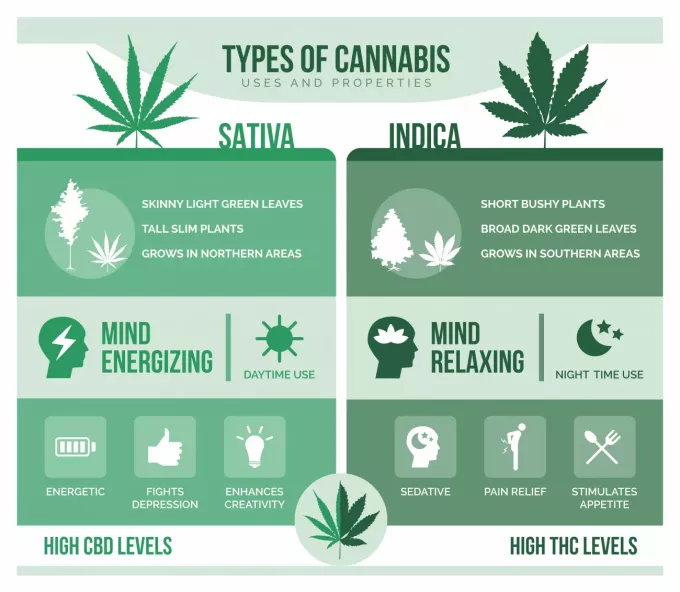
THCV and the Human Body
While we need to stress that no cannabinoid on the market today can prevent, treat, or cure any disease, sickness, or ailment, research has shown that THCV may be able to do some exciting things. For example, the inhibition of CB1 will cause an increase in glucose sensitivity. What does that mean?
With specific ailments, THCV has shown promise.
According to one study involving mice, researchers observed that THCV regulated glucose tolerance in both genetically obese mice and mice with dietary-induced obesity. In both cases, THCV encouraged energy expedition after promoting glucose uptake. Now, this was a preliminary study in mice, so don't go expecting this to work for you just yet, though the results are promising!
Glucose insensitivity is one outcome of Genetical obesity. In this test, THCV lowered genetic glucose intolerance.
Long term, this may mean that the effects of THCV may be long-lasting - something about which we should all be very excited.
More Studies About THCV?
Recent studies show that the administration of cannabinol derivatives may show other positive benefits. After much-needed research, researchers found that THCV might have the ability to promote fibroblast formation through resorption — though the study is in its very early stages.
Although the exact mechanism through which THCV does such things remains unclear, the possibility that THCV might influence bone growth, at least in a lab setting with rats, is encouraging.
Yet another study reveals that the CB2 receptor populates the osteoblasts and osteoclasts, cells responsible for the regulation of bone growth. According to this study, CB2 receptors outnumber their CB1 counterparts at synovial joints. In another study, mice deficient in CB2 receptors had a higher incidence of osteoporosis.
What does this all mean? You can't buy THCV from your local store or online retailer and expect to see bone growth of any kind. However, after many more years of research we may be in for some more exciting discoveries.
The Research on Inflammation
What is thcv? Well, it’s a compound that doesn't fight inflammation — yet. However, preliminary studies in rats show promise.
Inflammation is a defense mechanism mediated by the body in the presence of foreign matter such as bacteria and viruses. Essentially, inflammation protects you from grave injury and alerts you of an imposter before it can pose any threat.
However, inflammation is also responsible for pain and plays a role in auto-immune diseases like Myasthenia gravis.
New research shows that THCV might — and we very much stress might — battle inflammation through a CB1 blockade and CB2 activation. Again, your THCV gummies won't fight inflammation, but if scientists have their way, their work will result in something big in the next few years.
How? In research carried out on mice, THCV increased pain relief by reducing inflammation.
Reduced Appetite
Studies have shown that administration of THCV may potentially help curb obesity. So what is thcv? It’s a compound that reduces your cravings for food! THCV is also known as Diet Weed because it encourages satiety.
THCV decreases appetite increases feelings of fullness, and encourages the turn-over of glucose to ATP, the energy currency of the cells.
Thus, THCV promotes fat burning. In scientific terms, it also jumpstarts insulin sensitivity of the hepatocytes, which in turn regulates the feeling of hunger.
Anti-THC Effects
THC, the most psychoactive constituent of cannabis, is a CB1 and CB2 activator. This activation is responsible for many beneficial side effects, such as paranoia, short-term memory loss, and psychosis-like symptoms.
Co-administration of THC and THCV will reduce some of the unwanted effects of THC but may have little or no influence on the psychoactivity of THC. THCV’s inhibition at CB1 may be to minimize the less admirable qualities of THC.
However, more research containing larger sample sizes and possibly higher doses of THC is necessary. As is, it may be risky to extrapolate the results of this study to a widespread population.
Other Ways THCV May Help
Asides the aforementioned benefits of THCV, the following are areas where THCV may find its use.
- Energy
- Focus
- Creativity
- And more!
Does THCV Get You High? Yes, It Can!
The psychoactivity of THCV is under much debate because its behavior at the CB receptors is not as direct as it may seem. THCV will only reveal its psychoactive properties at high doses.
At low doses, THCV antagonizes the CB1 receptor. Thus, a cannabis strain containing mostly THC and a little THCV will be less effective than one containing only THC.
However, one recent study discovered that THCV ceases to antagonize the CB1 receptor at elevated concentrations. So, what is thcv? It’s a compound that may cause you to get slightly high, anyway!
Therefore, you’d need a lot of THCV to experience its psychoactive effects, and even at that, the experience may not be so long-lasting. Other articles have mentioned that THCV may be faster acting than THC. The psychoactivity of THCV resembles a racing car because of its quick onset of action and short duration of action. The scarcity of the compound hinders studies on the psychoactivity of THCV. It is hardly found in common THC strains but has been reported to be more concentrated in African, China, Indian, Thai, and Afghanistan strains. Some scientists believe that THCV was unfavoured in the natural selection process because of its antagonistic action on THC.
THCV may show up on a drug test and appear in a urine test. If you ingest a small dose of THCV, or a pharmaceutical product containing THCV, there are high chances that it will not show up in your test results. However, this isn't foolproof.
Is THCV Psychoactive?
THCV downregulates hunger, decreases appetite, and promotes early satiety even without THC intake. THCV’s inhibitory action on CB1 will reverse the intense hunger (munchies) associated with THC intake at low doses. This may be applied to experience a smoother psychoactive experience with THC; you may not have to worry about insatiable hunger when you take THC with THCV.
At higher doses, THCV begins to act just like THC. Recent articles state that the psychoactive properties of THCV promote mental clarity and do not cause a ‘’cloudy’’ mental state as THC may. High THCV concentrations generally enhance euphoric and cognitive effects alone or with THC.
THCV is generally safe to try at doses below 10mg. It is essential to identify the risk of increased heart rate before using high concentrations of THCV. Other symptoms to look out for are tiredness and lethargy. Do not operate heavy machinery or drive without supervision if it is your first time using THCV.
The interactions of cannabis products on pregnant and nursing mothers remain unclear. Medical practitioners suggest that you avoid these substances while pregnant and lactating. For people on multiple medications, kindly consult your medical doctor before adding THCV to your usual treatment regimen.

How Does THCV Compare To Other Cannabinoids?
To really understand the question “what is thcv,” you need to compare it to other cannabinoids. Seemingly minute differences in the structure of cannabinoids make a world of difference in the potency, severity, and range of activity of a cannabinoid. Here, we compare the activity of THCV to that of other cannabinoids like Delta 10 THC, Delta 9 THC, Delta 8 THC, and the non-psychoactive CBD.
|
THCV |
DELTA-10 THC |
DELTA-9 |
DELTA-8 |
CBD |
|---|---|---|---|---|
|
Antagonises the CB1 receptor at low doses |
Activates both CB1 and CB2 receptors |
Partial agonist at CB1 and CB2 at all doses |
Also promotes weight loss by increasing metabolism |
No psychoactive active effects at any dose |
|
Less potent psychoactive effects |
Psychoactive even at low doses |
Most psychoactive cannabinoid |
Activates CB1 receptor at low doses |
Derived directly from hemp plant |
|
Appetite reducing and energy boosting effects |
Also energy boosting |
Causes insatiable hunger |
Has a higher appetite-stimulating effect than THCV and even THC |
Also contributes to entourage effect |
|
Causes euphoria that improves mental clarity |
Also induces an uplifting experience |
May be characterized with sedation and decreased activity |
Psychoactive at all doses |
May promote or discourage weight loss. Causes appetite increase. |
How Does THCV Make You Feel?
Depending on the dose of THCV ingested, you may experience one or more of the following:
- Motivated
- Alert
- Focused
- Satiated
- Energized
- Clear-headed
At lower doses, satiety decreases appetite, and a boost of energy is expected. The mental clarity associated with THCV appears at much higher doses.

What Else Should I Know About This Cannabinoid - THCV?
THCV extraction is discouraged by its low availability in plants, but the extraction process is similar to that of other cannabinoids. The conversion of THCVA, the precursor of THCV, to THCV is caused by decarboxylation of the acid. The amount of THCV present in a strain is a factor of its sun exposure, climate, humidity, and other factors. The ideal environment for maximal THCV growth is yet to be identified, but the highest amount of THCV is usually found in African strains of cannabis.
THCV can be effectively extracted by supersaturated liquid-like ethanol or CO2. The liquid extract is separated into its components by a chromatographic process. The eluate containing THCV is then treated with heat under a vacuum to remove impurities and solvent molecules.
How Potent Is THCV?
The relative potency of THCV is highly dependent on its intended purpose. Users hoping to lose some weight will find THCV highly potent at helping them stick to diet plans.
To obtain its psychoactive properties, you may need doses higher than 10mg.
The Legality Of THCV
THCV is federally legal and legal in 38 states. The federal legislation allows for the sale and consumption of THCV as long as it is extracted from hemp plants and contains less than 0.3% THC. THCV is indirectly extracted from hemp plants since it is obtained from cannabinoids directly extracted from Cannabis.
At the state level, THCV is legal in all states that allow the use of cannabis strains for medical purposes. However, it is only permitted for adult use because of its risk of psychoactivity.
Where to Find THCV
As earlier mentioned, African strains boast of the highest THC concentrations. These strains of cannabis are known for higher THCV amounts than usual.
- Jack the Ripper
- Durban Poison
- Durban Cheese
- Pineapple Purps
- Power Plant
- Willie Nelson
Generally, pure THCV is yet to penetrate the CBD market. Most vendors sell THCV alongside THC or CBD because it is difficult to isolate. Some bales contain as much as 20% THCV.
Final Thoughts - Bottom Line
THCV is an analog of THC that users can take alone or with THC to reduce appetite and boost energy. The cannabinoid may become a beacon of hope in obesity and diabetes treatment and management.
Scientists believe that even more beneficial effects of THCV need to be explored. Its relationship with the endocannabinoid receptors mediates the significant positive impact of THCV. The primary obstacle to human research on THCV is its low availability. An increase in the interest of consumers will encourage larger-sized in vivo studies on the effects of THCV.
THCV has minor psychoactive effects; at low doses, it dampens the psychoactivity of THC. This may be applied by patients seeking the benefits of cannabis products but remain uninterested in its euphoric promises.

